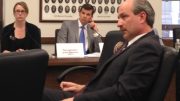By Jeffrey A. Roberts
CFOIC Executive Director
The Colorado Supreme Court is examining whether a newspaper is considered a “citizen” and therefore entitled to attorney fees when prevailing in open meetings lawsuits.
A year ago, in a victory for the Aurora Sentinel, the Court of Appeals ordered Aurora to publicly release the recording of an executive session in which city council members ended censure proceedings against a fellow councilor.
But the three-judge appellate panel decided not to award reasonable attorney fees to the Sentinel, even though the Colorado Open Meetings Law (COML) requires it when citizens successfully challenge violations in court. The Sentinel doesn’t meet the Merriam-Webster dictionary definition of a citizen as “a native or naturalized person who owes allegiance to a government and is entitled to protection from it,” Judge David Furman wrote for the court.

That opinion was “erroneous as a matter of law and must be reversed to avoid undermining the General Assembly’s intent to encourage — not only individual litigants but any and all members of the press and public — to challenge clear violations of the COML,” argues a Supreme Court brief submitted for the Sentinel by attorneys Rachael Johnson of the Reporters Committee for Freedom of the Press and Steve Zansberg, president of the Colorado Freedom of Information Coalition.
“News organizations regularly stand in the shoes of the public and provide a check on government institutions; Colorado sunshine laws are crucial to this effort,” the brief says. “With local news organizations across Colorado and the country facing ever-increasing financial barriers to taking on public records and open meetings litigation, news organizations like The Sentinel must be able to rely on the availability of fee recovery when deciding to pursue an open meetings violation in court.”
If it’s not reversed, the Court of Appeals ruling “will make fee recovery unavailable to news organizations even in cases involving the most flagrant violations of the COML, leading to less news reporting and a lesser-informed public — a result that would directly contravene the purpose of the COML,” it adds.
Under the open meetings law, the courts have jurisdiction to enforce violations “upon application by any citizen of this state.” In “any action in which the court finds a violation of this section, the court shall award the citizen prevailing in such action costs and reasonable attorney fees.”
If the Sentinel is a “citizen” for purposes of bringing litigation to enforce the law, “it should also be a ‘citizen’ for purposes of fee recovery provided for in the very same section of the Law,” Johnson and Zansberg argue.
There is nothing in the legislative history of Senate Bill 91-033, which added the attorney fee provision to the open meetings law, to indicate state lawmakers “intended to permit only natural persons (not corporate persons or entities) from recovering fees,” the Sentinel’s brief says. To the contrary, legislators during a 1991 Senate committee hearing noted that “quite often, it is the press who takes the lead” on open meetings issues.
The Court of Appeals’ ruling is inconsistent with prior legal interpretations of the open meetings law and the Colorado Open Records Act, it adds, citing several instances in which Colorado courts have awarded fees to corporate entities in those types of cases.
A brief submitted by Aurora earlier this week argues against the Sentinel’s status as a “citizen” and asks the Supreme Court to reverse the appellate court’s finding that the city violated the open meetings law. In an amicus brief, the Colorado Municipal League also asks for a reversal of the appellate ruling.
The statute, the city’s brief says, “grants any person standing to challenge an OML violation, but only allows a citizen of this state to be awarded its attorney fees.” If the General Assembly “meant to award attorney fees to any ‘person’ or the ‘prevailing party’ under the statute, it would have simply done so, and used a different term” other than citizen, it adds.
Prepared by attorney Corey Hoffmann, Aurora’s brief also says that each case cited by the Sentinel in which prevailing corporate entities were awarded attorney fees “had, as plaintiff, at least one citizen who was entitled to an award of fees and costs.”
In the Sentinel case, the Court of Appeals concluded that Aurora council members violated the open meetings law by inadequately announcing a Mar. 14, 2022, closed-door meeting and improperly deciding in secret to halt a censure action against Councilmember Danielle Jurinsky for comments she made about Aurora’s then-police chief and deputy chief.
Aurora claimed the executive session recording shouldn’t be released to the newspaper because it contains privileged attorney-client communications. But the city council waived any privilege “by describing everything that occurred” during the executive session in a letter included in a public meeting packet two week later, according to the appellate judges.
In its Supreme Court brief, the city argues that the Court of Appeals’ holding “erodes the protections of the attorney-client privilege and destroys the very basis of convening an executive session for purposes of receiving legal advice if the client cannot direct its attorney to prepare a document for Council consideration based on the legal advice it received from its counsel.”
Follow the Colorado Freedom of Information Coalition on X (formerly Twitter) @CoFOIC. Like CFOIC’s Facebook page. Do you appreciate the information and resources provided by CFOIC? Please consider making a tax-deductible donation.




